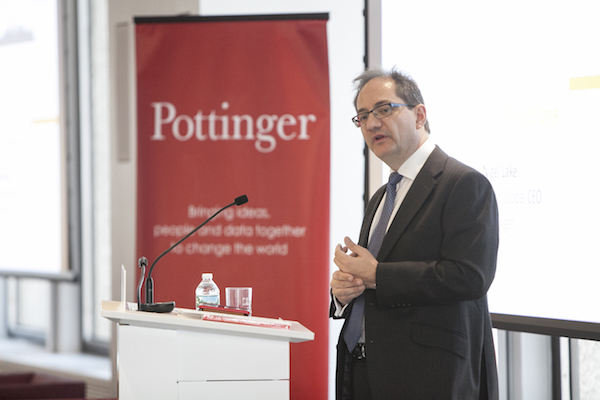Blogs
- Details
- In Blogs
- /
 After the summer bushfires, the coronavirus pandemic and associated economic shutdown, “unprecedented” must be a standout favourite for Macquarie Dictionary’s Word of the Year for 2020. For the first time in living memory, Australians - with people around the world - face the dual dangers of dire economic uncertainty along with a truly existential threat from COVID-19 contagion.
After the summer bushfires, the coronavirus pandemic and associated economic shutdown, “unprecedented” must be a standout favourite for Macquarie Dictionary’s Word of the Year for 2020. For the first time in living memory, Australians - with people around the world - face the dual dangers of dire economic uncertainty along with a truly existential threat from COVID-19 contagion.
Governments globally responded with increasingly severe restrictions to prevent spread of the virus, from insisting on “social distancing” in and lockdowns in several states in Australia to a four-week nationwide lockdown in New Zealand. This coronavirus crisis invites more than just the anxiety of worry, nervousness, or unease about an uncertain outcome: It creates the quite legitimate fear of very real potential danger or harm. So, to get through this crisis as individuals, as well as a community, we need to maintain our mental health as well as protecting our physical wellbeing by observing social and health protocols.
- Details
- In Blogs
- /
Nigel Lake, Executive Chair of global business advisory firm Pottinger, will tell this week's Myriad start-ups festival in Brisbane, running May 16-19, that Australia needs start-ups to protect its prosperity.
 Pottinger executive chair Nigel Lake will present at this week's Myriad Festival in Brisbane
Pottinger executive chair Nigel Lake will present at this week's Myriad Festival in Brisbane
In Australia, the canary in the employment coal mine is wobbling on her perch.
Though unemployment is low, real wage growth is stubbornly slow and is further imperilled by an imminent wave of disruptive technology.
The threat to the Australian dream is severe. More than 90 per cent of the value of Australia’s top 100 companies lies in old economy industries, with the top four companies all banks. In the US, the four largest companies are Microsoft, Apple, Google and Amazon.
Global competitors bring huge economies of scale and the capacity to steamroll local businesses on quality, service and price. New market entrants to Australia such as Amazon aren’t anti-competitive –they’re hypercompetitive.
So far this century, Australia has created just two tech start-ups worth more than A$1bn, namely Atlassian and Canva, collectively valued at about A$20bn. In contrast, the 10 largest US tech companies have created more than A$4 trillion during the same period.
Adjusting for relative economic size, America is more than a factor of 10 ahead of Australia.
The challenge facing Australia is that without a vibrant start-up sector to create valuable new companies in fields such as technology and life sciences, we will lose jobs to other regions.
Without investment capital to fund these companies, we will lose economic upside to other countries.
And without a determined effort to retain both investment and jobs onshore as companies mature, Australia’s over-exposure to low-growth, low-return sectors will increase, undermining the nation’s retirement savings and quality of life.
It’s not just about products or profits or jobs – we need to weave innovation into our social fabric to sustain the prosperity of our nation, so it’s really about “the future of everything”.
In short, the creation of new businesses and new jobs is of paramount importance. If we don’t seize this opportunity, there won’t be a future of anything.
This technology threat is not isolated to Australia. The EU recently created an advisory panel to ensure that technology creates economic opportunity, rather than destroying it. Its 10 members include Microsoft co-founder Bill Gates, World Economic Forum President Borge Brender, Microsoft President Brad Smith, Google Deepmind’s Mustafa Suleyman and Pottinger’s Cassandra Kelly, who is also speaking at Myriad Festival this week.
At Pottinger, which provides strategic advice and guidance for corporations and governments globally, our work with start-ups comprises just one-tenth of our business, although we believe it represents at least half of our future.
The reason start-ups are so significant is that they embrace and deploy disruptive technology because they are unhindered by legacy investments and business models. While only a few may succeed, those winners can change industries and, indeed, economies.
Without focussed support of start-ups, the odds are against Australia. Massive scale advantages create winner-take-all sectors, with nearly all industry leaders now based in either the USA or China.
Beyond domestic wealth polarization, wealth is becoming concentrated globally too. Many global behemoths pay little corporate tax and employ fewer people than 20th century corporations, creating real challenges for governments.
Even this is just the tip of the economic iceberg. Back in 2013, Oxford University published research showing that existing technology could already replace more than half of all existing jobs. This was before self-driving vehicles became an imminent reality – threatening an activity that generates significant employment in many countries.
To date, corporate complacency has held back the threat from technologies such as Artificial Intelligence (AI) and robotisation. With post-GFC economies growing and corporate profits strong, institutional inertia encourages executives to leverage current corporate structures and strategies to collect their performance bonuses.
However, when profits come under pressure from an economic slowdown, management will pull the cord to exploit AI and robotics and other emerging technologies to slash costs and maintain profits.
This will do more than just disrupt industries – it will deliver dramatic changes in employment too. Unemployment will increase significantly, both undermining personal tax revenues and adding to welfare costs.
In Australia, that technology is likely to come from offshore, making domestic economic recovery harder. No sector is immune. For example, Pottinger recently worked with The Pharmacy Guild of Australia to identify how community pharmacies will need to make profound changes as technology and automation reshape the healthcare sector.
Facing these risks, we need to do more than simply hope that employment in caring, creative or cultural industries - where human contact is essential - will grow quickly enough to replace lost jobs.
This did not happen in the agricultural and industrial revolutions, which both saw 50 years of near-zero real wage growth. And it has not happened in the USA during the past 50 years of IT revolution, where 80 per cent of the population earns pretty much the same today, in real terms, as in the mid 1960s.
To thrive in the 21st century, Australia needs to exploit the coming wave of technological change by encouraging the disruptive opportunities created by start-ups to challenge and change the status quo.
This column by Nigel Lake was first published by The Australian newspaper on May 12, 2018
- Details
- In Blogs
- /
I declare, I have seen the light although I was mired in doubt to start with.
What held me back from accepting the cloud into my life was fear - the terror of losing control.
It started when I joined an IT department on the bottom rung, as the support guy who installed a PC on your desk. From there, my role evolved into server applications, then networks and firewalls. In those days, experience was a brutal teacher, so you always needed a backup. We backed up everything before an upgrade because there was always a precedent for things going wrong.
More News...
- Video: Simon Hackett on how energy storage will change the grid (03 December 2015)
- CEO Fraud: A First Hand Encounter (09 October 2015)
- TPG dumps Internode PR after 15 years (02 September 2015)
- Sleeping With the Enemy: Ashley Madison (27 August 2015)
- Simple but strong: Why IdM (done right) is a no-brainer (24 September 2014)
- The Upside of Heartbleed (15 August 2014)
- Avoiding pitfalls on the productivity path to the Cloud (01 July 2013)
- Today’s IT security needs tools not gurus (29 April 2013)
- Bad habits are worse than bad guys in IT security (15 April 2013)
- The three elephants in the room with the NBN (31 October 2011)
- Of Myths and Mandatory Internet Censorship (09 April 2010)
- 2010 is the year of IPTV for Australia (18 January 2010)
- The real issues about high speed broadband (05 June 2007)
- Broadband: A decade of ADSL in Australia (19 August 2006)
- Broadband: The myth of FTTN (10 August 2006)
- Broadband: FTTN is Dead: Long Live FTTN (08 August 2006)
Off the Cuff

Simon Hackett speaks about Formula E racing on ABC Radio Adelaide
Australian renewable energy investor Simon Hackett last week spoke to Radio ABC Adelaide's Afternoons host Sonya Feldhoff about the benefits for replacing the cancelled Adelaide 500 motor race with a...
Read more
Seven simple steps for mental health in time of coronavirus
After the summer bushfires, the coronavirus pandemic and associated economic shutdown, “unprecedented” must be a standout favourite for Macquarie Dictionary’s Word of the Year for 2020. For the first time...
Read more
John Harris talks (a bit) about International Albinism Awareness Day on ABC Radio
John Harris, who has the honorary role of PR guy for the Albinism Fellowship of Australia, was interviewed by Peter Goers on the Evenings show of ABC Radio Adelaide on...
Read more
Start-ups are key to the future of everything
Nigel Lake, Executive Chair of global business advisory firm Pottinger, will tell this week's Myriad start-ups festival in Brisbane, running May 16-19, that Australia needs start-ups to protect its prosperity. Pottinger...
Read moreContact
Impress Media Australia
P: +61 8 8431 4000
E: john@impress.com.au
W: www.impress.com.au
Street:
Impress Media Australia
313 Portrush Road,
Norwood SA 5067
Click here for our location
Postal:
Impress Media Australia
Box 95, Kensington Park
South Australia 5068


